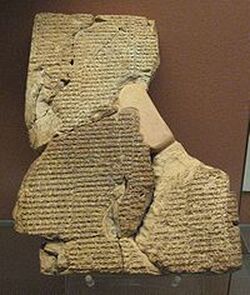
Science, Food Laws and Hygiene Laws in the Holy Books
Christians and Muslims, when asked for proof of their claim that God or Allah exists, often point out that the Bible and Qur’an describe food and hygiene “laws” or “commandments” which were purported to be preventive measures that might help to avoid poisoning and illness. In ancient times, when knowledge of bacteria and viruses was nonexistent, codifying medical knowledge in the holy texts seemed like a good idea.
Since the holy books were written quite recently, compared to the thousands of years of existence of humans and their ancestors and progenitors, it is reasonable to ask why god waited so long before divulging such important, life-saving information. It seems logical that the writers of such laws and commandments simply recorded what people had learned from past-experience and that they wrote down the accumulated knowledge of that time. Some food “laws” have been found on tablets and archaeological evidence which pre-date the construction of the holy texts. Why did God wait so long to incorporate such important knowledge in the holy books?
I have included below a Harvard.edu. paper that addresses this conundrum. The biblical food laws, as it turns out, are fascinating.
Anthropologist Milgrom noted that the pig, in particular, was widely reviled throughout the ancient Near East. He cites an Assyrian tablet dated in the sixth year of the reign of Sargon that reads: "The pig is unholy.. bespattering his backside, making the streets smell, polluting the houses. The pig is not fit for a temple, lacks sense, is not allowed to tread on pavements, [and is] an abomination to all the gods."
Scolar Harris extends this cost/benefit analysis to the Bible's list of birds prohibited as food. He writes, "Unless they were close to starvation and nothing else was available, the Israelites were well advised not to waste their time trying to catch eagles, ospreys, sea gulls, and the like, supposing they were inclined to dine on creatures that consist of little more than skin, feathers, and indestructible gizzards in the first place”.
As far as the Astronomical science is concerned, people of those days had observed the sky for thousands of years and since they were as intelligent as we are they had quite a bit of astronomical science already and this knowledge is recorded in the holy texts. I noted for example that it was claimed that gravity was discovered, because some stars were attached with chains. This reflected the fact that stars in constellations were seemingly connected because they always kept the same distance from each other. They saw the sky as a two dimensional surface and did not realize yet the stars were in a three dimensional space so that two stars in a constellation might be at very different distances from the earth. The writings in the Qu'ran were simply a reflection of the knowledge and speculations of the time.
In conclusion we can safely assume that these laws were not heavenly received but simply reflected the accumulated knowledge at the time of writing. Further reading is recommended.
https://dash.harvard.edu/bitstream/handle/1/8846735/wwilkenfeld.html?sequence=2&isAllowed=y

 RSS Feed
RSS Feed